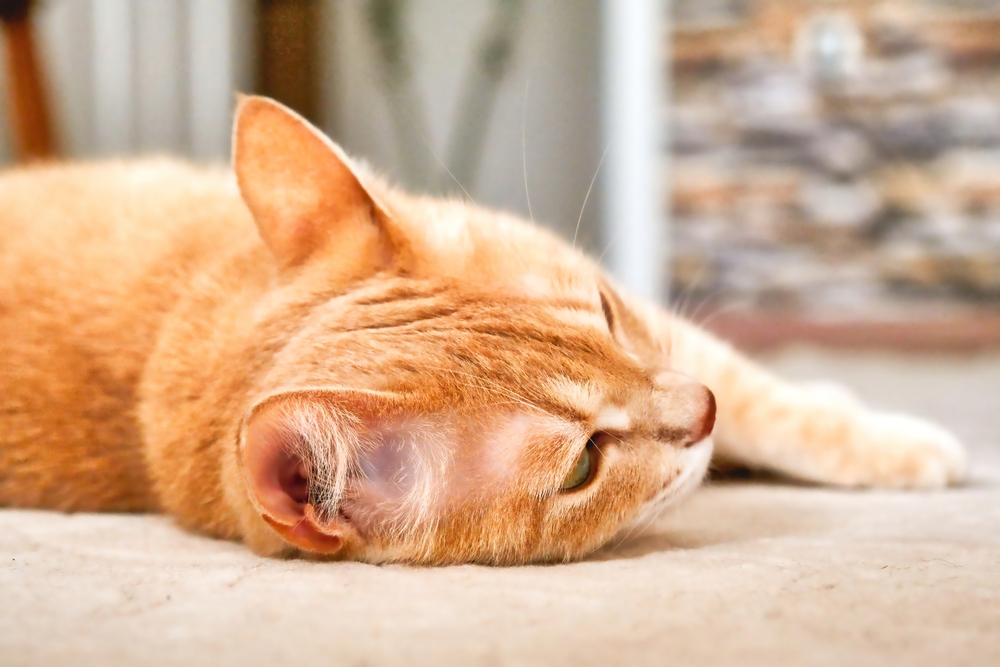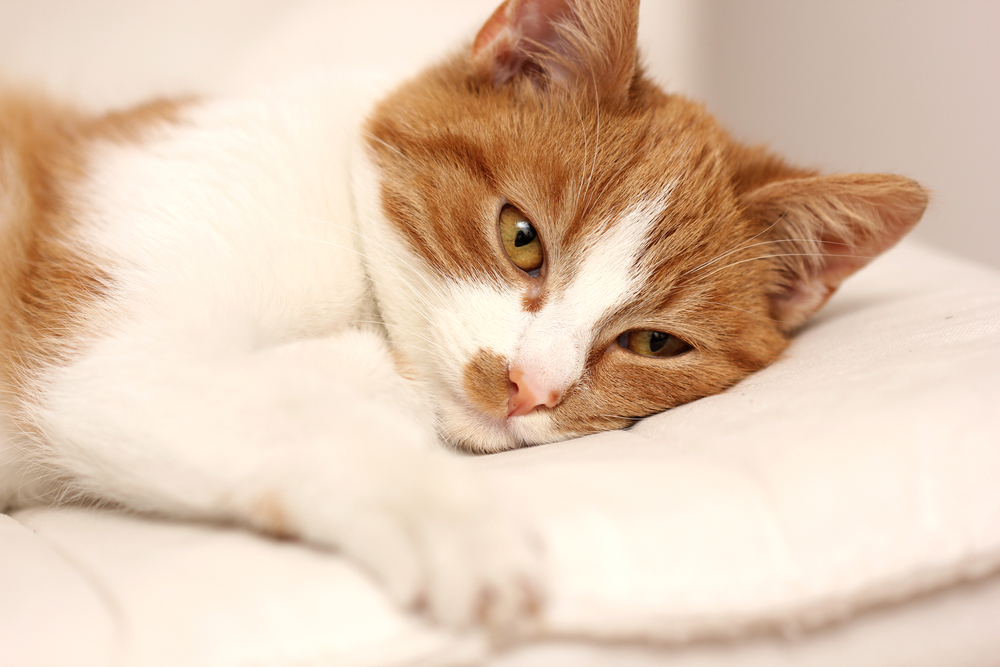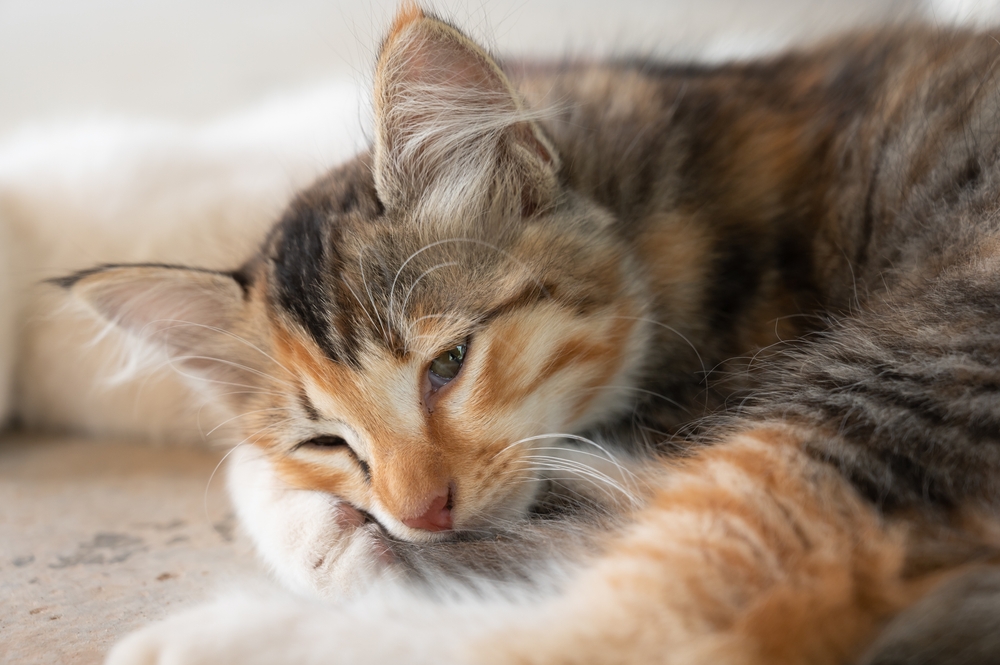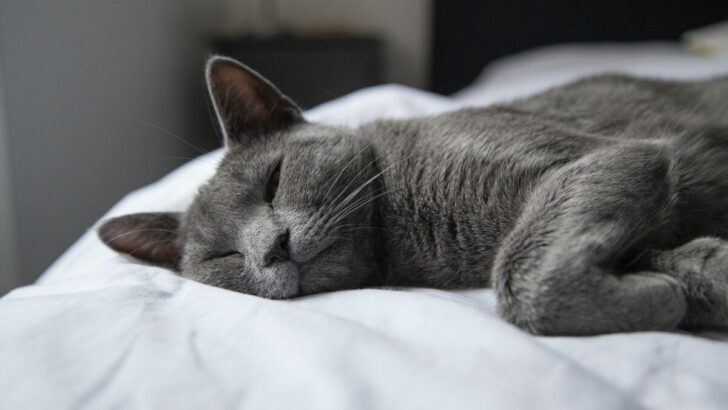“Should I leave my dying cat alone?”
We’d like to say “No!” and be done with the article, but we’re aware there’s much more to that answer than meets the eye.
Our fluffy friends are a part of our family and we’re devastated when we spot something wrong with them. We’re obsessed with our furbabies because they’re warm-hearted, cute, and cuddly. We’re over the moon when we’re awarded their playful bops with a paw or their deep-throaty purrs.
Our lives wouldn’t be the same without them.
Now, the naysayers might argue how we know we’re going to have to say goodbye sooner or later. But that doesn’t make matters any easier. Before we’re ready to face reality, we start noticing our feline friends pulling away, hiding, and barely holding on, and we don’t know what to do.
We’re sorry for what you’re going through and we’re keeping our fingers crossed that our article sheds some light on what you’re supposed to do when trying to comfort your dying cat.
Why does my dying cat want to be alone?

Cats seem to be aware of death.
When they’re suffering, they are aware that there’s something wrong with them and are known to hide what they’re going through. We’ve seen situations where cats conceal certain symptoms and end up not getting the medical help they need to get better.
When cats notice they’re getting weaker, they’re not necessarily aware that they’re dying – but they do know there’s something wrong with them. Cats are predators, but they’re also prey.
Because of that, felines know that they’re vulnerable when they’re hurt, and their instincts tell them to hide to protect themselves. Cats don’t want to be alone when they’re dying.
But we’re conditioned to think that way because we don’t understand why a cat that’s safe and secure from predators would want to hide under the table or run away to the basement.
Whether they’re protecting themselves from predators, trying to find a solitary spot where they can let their guard down, or protecting their owners from pain, felines are adamant about retreating when they’re dying. Now, does that mean we should leave them alone even though we don’t want to?
Should I leave my dying cat alone?
No, you shouldn’t. No matter what your cat wants you to think, she’s not prepared to go through such a terrible experience on her own. Whether she becomes too weak to move, starts showcasing strange behavior, or even gets aggressive, she wants you to be there and comfort her.
We’d go as far as to argue that you are the only one who can offer your cat the physical and emotional support she needs when she’s going through a tough time. We don’t know whether she’s aware that she’s dying, but we know she doesn’t want to be alone – she just thinks she needs to hide to protect herself.
When you notice her slowly pulling away, do whatever you can to be there for her. We’ve compiled a range of things you can do to make your cat more comfortable and to make sure she knows she’s not alone.
What signs do you need to be on the lookout for, though?
Signs your cat is dying

1. She’s refusing to eat
When you start Google searching “Should I leave my dying cat alone?” you’ve probably already received the bad news from your vet. We’re sorry you’re going through something as heartbreaking as that, but we’re hoping we can help you understand what your cat’s going through a little better.
Cats adore eating, there’s no question about that. When your cat starts refusing to eat, you know that she’s too weak to do her favorite thing. Whether you give her medication to help her eat more or accept the situation and allow her to do whatever she wants to do, we’re sending you our support.
2. She’s overgrooming or not grooming at all
Grooming is a huge part of a cat’s day. Cats resort to grooming when they get matted and tangled, to get rid of parasites, or even to cool themselves down (thanks to saliva). When your cat stops grooming or starts overgrooming, you know something’s not right.
Overgrooming is typically a stress response – and you’d expect a dying cat to be stressed out and overwhelmed. On the other hand, your cat might stop grooming because she can’t be bothered to do that when she’s suffering from God knows what.
When you notice your cat looking a little unkempt and untidy, you might want to help her out. Gently brush her coat, wipe her down with warm water and a clean cloth, and make sure her fur doesn’t get matted and tangled.
3. She has trouble sleeping
Cats are crepuscular, which means they’re active at dawn and dusk and rest during the day. Most cats, however, sleep through the night because that’s what humans do. Moreover, cats rest better when they’re alone – during the day, they’re bothered by people, children, and animals that come around.
If your cat stops sleeping through the night, gets overstimulated, or even becomes aggressive, she’s probably getting to the point where she knows something’s wrong with her. Shower her with affection, snuggle her before bedtime, and allow her to sleep with you. Why not?
4. She’s hiding

Now, that’s probably why you’re wondering “Should I leave my dying cat alone?” Needless to say, she can’t control her urges even though she knows she’s better off by your side.
We’ve mentioned that wild cats hide when they’re dying because they’re protecting themselves from predators. While your cat doesn’t need to worry about predators hurting her, she’s following her urges because she doesn’t know what to do when she’s unwell.
We’d recommend you to leave her alone for a little while, but keep a close eye on her. Make sure she knows you’re there for her when she’s ready to come out from under the bed.
5. She’s depressed, detached, and different
We know you don’t want to hear this, but when your cat becomes depressed, detached, and different, she’s ready to say goodbye.
When you catch her doing something she’s never done before, moping on the floor, or even yowling, you might want to do the opposite of what you came here to ask about: Snuggle with her, talk to her, and make sure she knows you’re there for her.
What should I do to comfort my dying cat?
1. Go for regular veterinary checkups
One thing’s for sure, you shouldn’t leave your dying cat alone. Other than that, there are a few things you can do to make the entire experience better for both of you.
Whatever your cat’s suffering from, she’s probably going to need veterinary care. Regardless of what her diagnosis might be, schedule regular vet checkups to ensure she’s getting the care she needs. Be an advocate for your cat and make her as comfortable as she can be considering the circumstances.
2. Make sure she’s fed even when she refuses to eat

We know that’s a tough task, but your fluffy friend needs food to be strong enough to endure whatever she’s going through.
With proper nutrition, plenty of water, and physical activity, she’s guaranteed to go through treatments with a smile on her fluffy face. She’s probably going to refuse food, but you need to figure out a way for her to eat enough to get through the day.
She’s going to get annoyed with you when you try to force-feed her or feed her with a syringe. But that doesn’t mean that you shouldn’t try. She’ll be grateful when she figures out she’s feeling better because of that.
3. Continue with regular grooming and hygiene
We know you want what’s best for her, which is why you need to continue with regular grooming and hygiene no matter what. Cats sometimes stop grooming themselves because they’re uncomfortable or they’re hurting themselves that way.
Consult with your vet before you take over grooming duty, but once you get the green light, make sure you groom your cat regularly to keep her clean and comfortable. Consider sedating your cat to make the grooming process more tolerable for her.
4. Provide a safe and secure spot for her

Cats don’t want to be alone when they’re dying, but they also don’t want to be surrounded by a bunch of people, children, and animals. You might want to provide your cat with a safe and secure spot she can retreat to when she’s overwhelmed or overstimulated.
You can help her by setting up an area or an entire room she can spend her time in when she doesn’t want to be around anyone. You shouldn’t stop checking up on her, but you shouldn’t bother her, either – read the room and do whatever she’s okay with.
5. Shower her with affection
We’ve arrived at the end of the article with a tip that’ll help get you through the toughest of times. We suggest showering your cat with affection, cuddling with her every moment she lets you, and doing all you can to make her happy. We’re sending you lots of love!
